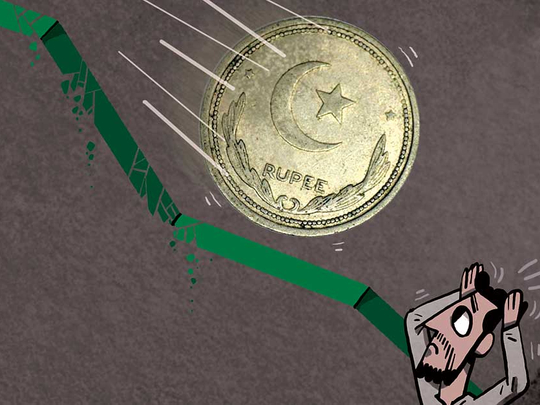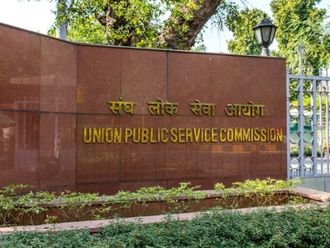
The Pakistan Muslim League-Nawaz (PML-N) government led by Nawaz Sharif — that completed a full five-year term on June 1 and was replaced by a caretaker government to hold elections on July 25 — has left behind a collapsing economy with serious socio-economic challenges for Pakistan. This includes large fiscal and current account deficits; unsustainable public debt, both domestic and foreign; and rapidly declining foreign exchange reserves. Stagnant investment during the PML-N term has led to rising unemployment in a growing population. Exports fell 20 per cent. During the last five years, 2.765 million people have left the country seeking employment overseas. There has been an unprecedented rise in corruption. The state seems to have abandoned its responsibility of providing essential municipal and health-care services, education and security.
Pakistan has not been able to broaden its tax base. On the contrary, in a population of 200 million people, just a million filed income tax returns last year, of which, the bulk constitutes salaried individuals whose tax is deducted at source. That indirect taxes now constitute 92.4 per cent of revenue collection in the country indicates a systemic failure. People are not prepared to pay taxes when an unusually large sum of public money is used to maintain the lavish perks and privileges of the ruling classes.
Having failed to generate revenue, the PML-N government relied on unbridled borrowing. In five years, the government added $35 billion (Dh128.73 billion) external debt, when in the previous 66 years the figure stood at $61 billion only. Debt servicing now eats up more than 40 per cent of Pakistan’s national tax collection. Though under strict International Monetary Fund (IMF) monitoring, the government unwisely maintained an artificially inflated currency exchange rate with IMF’s full acquiesce, which promoted a mistaken sense of calm.
The falling rupee value in the face of a heavily indebted economy will now cause serious difficulties for a majority of Pakistanis. Rising cost of imports, especially oil, will fuel inflation across the board. Notwithstanding, the hopes that the incoming government will make hard choices will cost it popular support and erode its political standing. When many politicians are contesting elections from more than one National Assembly seat, of which they will be allowed to retain only one, it is indicative of the high political and financial cost that will weigh heavily on the nation with a number of by-elections becoming inevitable almost immediately after the general election.
While the ultimate responsibility lies with Sharif, much of the economic disaster is the handiwork of Ishaq Dar, the former finance minister, whose son is married to Sharif’s daughter. He is under trial for accumulating wealth beyond known sources of income and is an absconder from Pakistan. He had worked for Sharif’s companies and is known for figure-fudging — a practice he continued as the country’s finance minister.
Many stakeholders seriously believe that the economy was manoeuvred to sink at the behest of those who wanted to fold up Pakistan’s nuclear programme. In return, the PML-N leadership was allowed a free run to make money and launder it for purchasing millions of dollars’ worth of assets abroad. The Sharif and Dar families are among the richest in Pakistan with much of their wealth stashed abroad.
The most immediate challenge facing the incoming government is how to meet its international obligations and prevent insolvency. The IMF believes Pakistan’s external debt will reach $145 billion over the next five years. Pakistan does not have the capacity to pay back this amount. Such a scenario leaves the country dangerously at the mercy of international lenders who use leverage in extracting political compromises from Pakistan as a quid pro quo for allowing Islamabad access to IMF funds.
It is now certain that the new government due to be sworn-in early next month will begin its term seeking funds from IMF to tide over the impending default. The stabilisation programme, which Pakistan will be compelled to implement, will stunt growth and limit job creation, raising income inequality and poverty with immediate adverse ramifications for the new government. This time, however, Pakistan’s tense relations with the United States will have a bearing on the position Washington takes over any likely request for financial aid from Islamabad.
The new government will need to handle the politically explosive task of renegotiating the 7th National Finance Commission (NFC) Award. The arrangement made in December 2009, on political rather than any sound economic basis, provides a disproportionate amount of revenue to the provinces, leaving the federation with insufficient funds to meet its obligations. In nearly ten years since the NFC Award was instituted, the federal government has struggled to manage its liabilities with the money left behind. Now, even the army, an important stakeholder, has expressed concern at skewed arrangements in favour of provinces at the expense of the federal government.
The challenge of reforming the tax structure, administration and controlling corruption is of Himalayan proportion. If these issues are not addressed, Pakistan will continue to remain trapped in cycles of borrowings, thereby creating further imbalance in a fragile economy. The problems are so many and so complex that it is hard to even prioritise them. Will the new government have the political determination and stability to tackle such a gigantic task? Only time will tell.
Sajjad Ashraf served as an adjunct professor at the Lee Kuan Yew School of Public Policy, National University of Singapore, from 2009 to 2017. He was a member of Pakistan Foreign Service from 1973 to 2008 and served as Pakistan’s consul general to Dubai during the mid 1990s.








